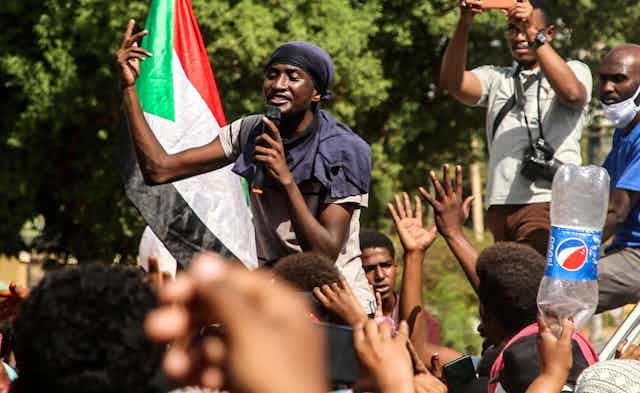Sudan is in a state of chaos after last month’s coup, in which army chief General Abdel Fattah al-Burhan, dissolved the government, declared a state of emergency and arrested the prime minister, Abdalla Hamdok, and leading opposition figures.
Almost immediately, opposition groups took to the streets and have maintained street opposition since with protests and civil disobedience. A demonstration in Khartoum met with fierce opposition from the army and the feared Rapid Support Forces, a militia established in 2013 to fight armed rebel groups in the country’s war-torn Darfur region. Three people were killed and a further 100 injured.
Read more: Explainer: what Sudan's coup is about and why the rest of the world needs to act
Sudan’s military has always played a dominant role in the country’s politics and was instrumental in removing the previous president, Omar al-Bashir in 2019. But they did so alongside a broad coalition of civil society groups, including student bodies, trade unions and other community groups.
Resistance: home and abroad
The Sudan Professionals Association (SPA) is a key player in the protests. Founded in October 2016, it is an alliance of three of Sudan’s largest professional groups: the Central Committee of Sudanese Doctors, the Sudanese Journalists Network and the Democratic Lawyers Association. It acts as an umbrella organisation for around 18 other trade unions representing professional associations ranging from academics and teachers to engineers and health professionals.

There is also significant resistance within senior civil service offices and some ministries. In a statement posted on Facebook on October 29, ministries and agencies of Sudan’s most populous state, Khartoum, which includes the capital and nearby city of Omdurman, said they would not step aside or hand over their duties and declared a general strike.
There has also been notable opposition from the international community, with Saudi Arabia, UAE, UK, US urging the lifting of the state of emergency and the release of those recently detained. In the end, international criticism and pressure could prove to be crucial. The parlous state of Sudan’s economy means that it needs to rely on external finance for any form of recovery.
While Egypt and Abu Dhabi have close links to Burhan, they stand to gain little from continuing instability and international opposition that draws in these influential actors may be the additional leverage needed to roll back the latest military authoritarianism.
The Sudanese military junta is itself divided, principally between the Sudan Armed Forces led by Burhan and the RSF militia led by General Mohamed Hamdan “Hemeti” Dagalo, who is also the deputy chairman of the Sovereignty Council. There are internal economic rivalries over the military’s involvement in business, but also the proposed integration of the RSF, perceived by many to be at the heart of a shadowy commercial empire. The RSF also reputedly pays substantially higher salaries than the army, which has caused resentment among low- and middle-ranking SAF officers who regard the RSF command as less than legitimate.
Following violent retribution by the security forces against protests, the resistance committee has advised people to “stay in their neighbourhoods, barricade roads and continue with civil disobedience”. According to the most recent reports, the death toll among protesters stands at 12 people killed and more than 200 wounded, although the security forces deny using live ammunition.
Divided opposition
With most of the senior civilian leadership in house arrest or detention, overall coordination of opposition actions may become difficult. Many of the senior figures in the civilian leadership had been part of the joint civilian-military council appointed after the 2019 coup, and many of these figures have been detained alongside Hamdok. From house arrest, Hamdok and other opposition figures continue to talk with the United Nations, but, as the UN’s special representative to Sudan, Volker Perthes, said on November 1: “Real negotiations … can only be held between people who are at liberty.”
Hamdok remains the leader of the Forces of Freedom and Change (FFC) a wide coalition that formed during the 2018-19 protests against Bashir and was a key part of the transitional government formed in April 2019 after Bashir’s ousting. The FFC holds 67% of the seats in the Legislative Council, which was set up as a parliament to steer the country during the three-year transition period. The council is in favour of establishing civilian rule and pursuing the prosecution of those responsible for war crimes under Bashir. But it would be a mistake to think of the FFC as a unified organisation.
Sudan’s long history of political fragmentation has allowed the military to step in on regular occasions to, as they put it, “restore order” – and currently there are at least 80 political parties in Sudan. The FFC includes some bigger parties, including the National Umma Party (NUP), the Sudanese Professionals Association (SPA), the Sudanese Congress Party (SCP), and the Sudanese Communist Party. SPA leader, Ismail al-Taj, and Sediq al-Sadiq al-Mahdi, the leader of Umma, Sudan’s largest political party, have also been arrested.
Another important opposition leader to have been detained since the military took power is SCP leader, Omar al-Degier. His group of centre-left, secular liberals, students and professionals was key in the coordination of the protests against Bashir and in calls for more civilian rule. While the SPA wields considerable control over organised labour, the SCP is able to mobilise large numbers of protesters partly through social media.

The main issue facing the FCC is the internal divisions between these major groups, particularly with the SPA which split from the FCC in June 2020 and has since itself divided into factions.
Ironically, one of the achievements of the military takeover may well be to unite these fragmented groups in opposition.

